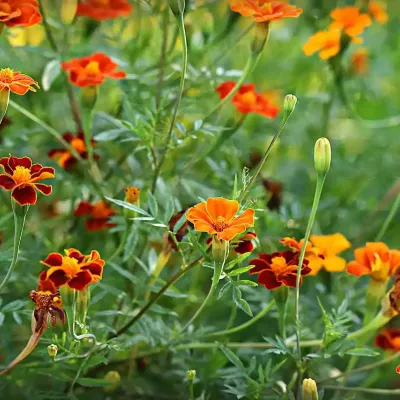How to Prevent Pest Infestations in Your Garden and Outdoor Spaces

Outdoor living is part of the enticement to owning your own home. Breathing fresh air, playing backyard games, striking up a barbecue, entertaining friends and family, and growing flowers and vegetables are part of the package.
When it comes to the outdoors, along with grass, trees, and flowers, you’ll find bugs—lots of them. Keeping insects completely out of the picture is unlikely, but preventing pest infestations in your garden and living areas helps to keep people, animals, and plants healthy.
Know Your Garden
A healthy ecosystem, understanding the needs of your outdoor oasis, and keeping an eye out for problems are the start to preventing issues in the garden, flower, and groundcover beds. Exterminating may not be necessary or practical, especially if you don’t know your bugs.
Beneficial Insects or Pests?
Not all bugs are destructive pests. Beneficial insects keep bug populations under control while living in harmony with certain pollinators. Beneficial insects also eat other insects that carry diseases.
Beneficial bugs to have in your yard include:
- Ladybugs
- Honeybees
- Bumblebees
- Praying mantises
- Lacewings
- Hoverflies
- Ground beetles
- Parasitic wasps
- Damsel bugs
- Assassin bugs
- Tachinid flies
- Monarch butterflies
- Gulf fritillary butterflies
Identifying and supporting beneficial insects in your garden and outdoor living spaces will help you keep destructive parasites – like wood-munching termites in Texas – at bay.
How To Keep Pests Out Of Your Garden
One of the best ways to prevent pest infestations in your garden is by taking these preventive measures:
Yard Clean-Up
- Decaying leaves, stems, and debris in gardens and flowerbeds provide ideal nesting spots for insects. To encourage new growth, clear out this old material at least twice a year. This process includes:Clear away fallen leaves, weeds, and other debris where harmful pests might hide or breed.
- Trim overgrown bushes and trees to eliminate potential hiding spots and pathways for unwanted pests.
- Dispose of plant residues and garden waste properly to prevent common pests from using them as breeding grounds.
- Regularly refresh mulch to prevent it from becoming a nest for pests such as termites, ants, or even fungi.
Rotating Crops
When planting your garden each year, rotate plants and vegetable crops to disrupt insects’ breeding cycles. You should also incorporate a variety of plant species to confuse pests, attract beneficial insects, promote a more balanced ecosystem, and minimize the risk of widespread infestations.
Companion Planting
Companion planting — planting two or more connected plants together — helps to attract beneficial insects while repelling pests. For example, compatible flowers such as Shasta daisies, marigolds, and alyssum attract pest-controlling beneficial bugs to landscaping. Just be sure to space plants properly to keep them from overcrowding and spreading fungi and diseases.

Attracting Natural Predators
Create habitats like insect hotels, birdhouses, and water sources to attract natural predators like insect-eating frogs, birds, and lizards. Minimize or avoid using harsh chemical pesticides that can harm beneficial insects and disrupt the natural balance of your garden.
Using Natural Pesticides
While ultrasonic pest control may—or may not—deter pest populations, diluted neem oil alters the breeding and eating habits of harmful insects and won’t affect animals or people. Neem oil comes from the seeds of a neem tree (Azadirachta indica) and is used in a variety of products, such as soaps, cosmetics, and toothpaste.
Homemade insecticides with liquid soap and water can be effective against soft-bodied insects like mealybugs, mites, and aphids. If you’re not the DIY type, organic and natural pesticides are
available at your favorite home and garden store.
Traps and Barriers
Insect traps come in various shapes and sizes and can be installed on posts or nearby trees in the yard as effective tools for keeping insects out of your yard.
Here's how you can use them:
- Yellow Sticky Traps: These traps attract and capture flying insects like aphids, whiteflies, and fungus gnats. Place them near plants that are susceptible to these pests.
- Pheromone Traps: Used primarily for specific insects like moths or beetles, pheromone traps lure pests with synthetic hormones, reducing their population.
- Slug and Snail Traps: Bury containers in the soil filled with beer or a mixture of water and yeast to attract and drown these pests.
- Fruit Fly Traps: Create traps using apple cider vinegar or ripe fruit in containers with a small opening covered by plastic wrap with holes. Fruit flies will be attracted and trapped inside.
- Row Covers: Use floating row covers made of lightweight fabric to physically block insects from reaching plants. These are especially useful for protecting crops from pests like aphids, caterpillars, and beetles.
- Copper Barriers: Copper tape or barriers around plant containers or raised beds can deter slugs and snails, as they receive a mild electrical shock from touching copper.
- Mesh Screens: Install fine mesh screens or netting around vulnerable plants or garden areas to prevent pests like birds, butterflies, and insects from accessing them.
- Physical Barriers: Use barriers such as diatomaceous earth (DE) or eggshells around plants to create abrasive surfaces that deter crawling insects like slugs, snails, and ants.
When using traps and barriers, it's important to inspect and maintain them regularly. Replace sticky traps regularly when they become full, empty slug and snail traps, and repair any damaged barriers to ensure their effectiveness in keeping insects out of your yard.
Feed and Weed
Healthy plants are stronger and less susceptible to diseases and garden pests. When taking care of your garden,
- Choose Resistant Varieties: Select plant varieties known for their resistance to common garden pests in your area. Many plant breeders develop cultivars with built-in pest resistance. Look for disease-resistant and pest-resistant strains of vegetables, fruits, and ornamental plants when planning your garden.
- Optimize Growing Conditions: Ensure that plants receive adequate sunlight according to their specific requirements to promote robust growth and resilience. Avoid overwatering or underwatering, as stressed plants are more susceptible to pest infestations. Use organic matter, compost, and mulch to enrich soil fertility and support strong plant growth.
- Practice Good Plant Care: Regularly inspect plants for signs of stress, nutrient deficiencies, or pest damage. Prune diseased or damaged plant parts promptly to prevent the spread of pests and diseases. Apply organic mulch to conserve moisture, suppress weeds, and create a healthier growing environment for plants.
- Encourage Beneficial Microorganisms: Incorporate compost into the soil to promote beneficial microorganisms that contribute to plant health and pest resistance. You could also apply beneficial microbes such as mycorrhizal fungi to enhance nutrient uptake and improve plant resilience.
- Avoid Stressors: Minimize stress factors like excessive heat, drought, or nutrient imbalances, as stressed plants are more vulnerable to pest attacks. You should also make sure to place plants at appropriate distances to help improve air circulation and reduce the risk of fungal diseases and pest infestations.
- Weed Management: Remove weeds promptly to prevent them from competing with your plants for nutrients, water, and sunlight. This reduces stress on your plants and helps them thrive.
By focusing on growing healthy plants through proper care, selecting resistant varieties, and fostering a diverse and balanced garden ecosystem, you can naturally enhance their ability to resist insect pests and diseases.

How To Keep Pests Off Your Patio
Here are a few ways to keep mosquitoes and other annoying bugs away from your patio or
deck.
- Use yellow or amber outdoor lights instead of bright white lights, as they are less attractive to insects like mosquitoes and moths.
- Sweep the patio regularly to remove fallen leaves, debris, and food crumbs that attract insects. Make sure to clean spills promptly to prevent attracting ants, flies, and other pests.
- Keep the patio free of sources of food like pet food, fruits, and snacks. Store pet food in sealed containers indoors.
- Burning citronella candles or using torches with citronella oil can help repel mosquitoes and other flying insects. You can also apply natural insect-repelling essential oils like lavender, peppermint, or eucalyptus to your skin or use them in diffusers to deter insects.
- Mint mouthwash is known to keep mosquitoes away from the patio. Add it to a spray bottle and treat tables and chairs for a fresh scent and pest-free area. The same is true about hydrogen peroxide, but be sure to avoid spraying it on food or drinks.
- Grow plants like citronella grass, marigolds, lavender, and mint around your patio to naturally repel insects.
- Consider installing a screened-in porch or patio enclosure for added protection against insects while still enjoying the outdoors.
- Eliminate standing water by emptying and cleaning birdbaths, flowerpot saucers, and other containers that collect water regularly to prevent mosquitoes from breeding. Also, fix any leaks or drainage issues that create puddles or stagnant water near the patio.
- Install ceiling fans or use portable fans on the patio to create airflow. This not only makes it more comfortable for you but also makes it harder for flying insects like mosquitoes to fly in still air.
When you have more bugs than you can handle, contact our team of local exterminators at Anytime Pest Elimination. With our comprehensive professional pest control services, we can help you identify signs of pest activity and get rid of unwanted visitors.
